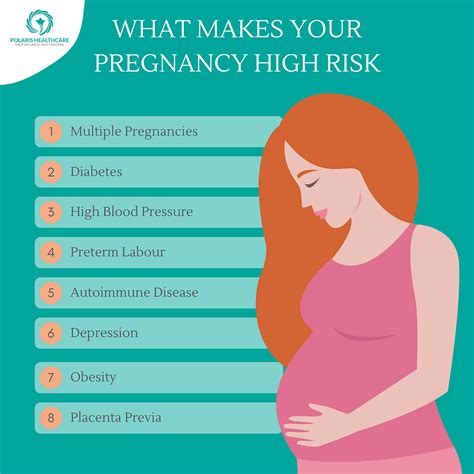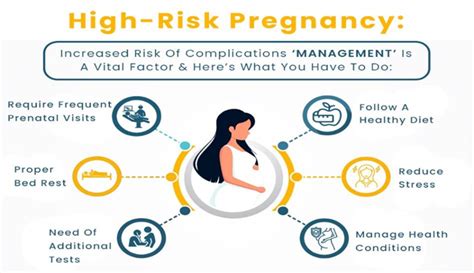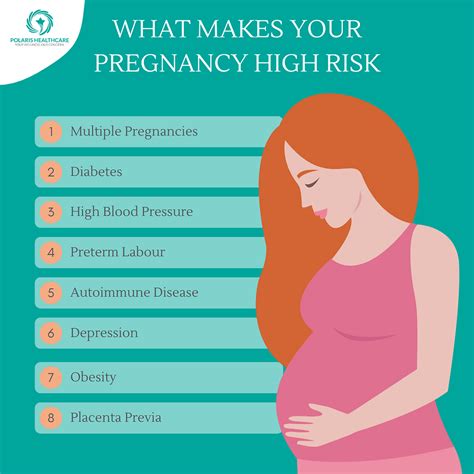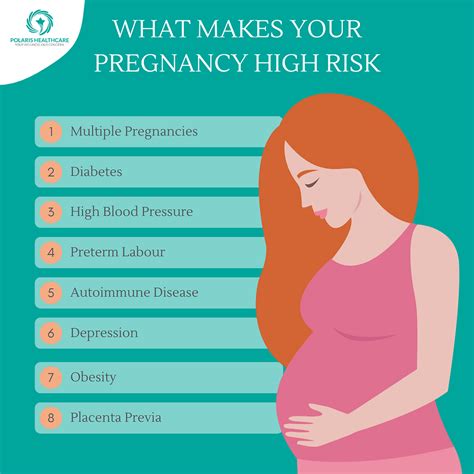Intro
Manage high risk pregnancy with expert tips. Learn 7 essential strategies for a healthy pregnancy, including prenatal care, nutrition, and stress management to minimize complications and ensure a safe delivery.
Pregnancy is a remarkable and life-changing experience for women, but for some, it can be a challenging and high-risk journey. High-risk pregnancies can be caused by various factors, including pre-existing medical conditions, age, or complications that arise during pregnancy. Women who experience high-risk pregnancies require special care and attention to ensure the best possible outcomes for both mother and baby. In this article, we will delve into the world of high-risk pregnancies, exploring the causes, symptoms, and management strategies. Whether you're a soon-to-be mother or a healthcare provider, this comprehensive guide will provide you with valuable insights and practical tips to navigate the complexities of high-risk pregnancies.
High-risk pregnancies can be a source of anxiety and concern for expectant mothers, but with the right guidance and support, they can be managed effectively. It's essential to understand the risks and take proactive steps to minimize them. By working closely with healthcare providers, women can reduce the risks associated with high-risk pregnancies and ensure a healthy and successful outcome. In the following sections, we will discuss the causes of high-risk pregnancies, the symptoms to watch out for, and the management strategies that can help mitigate the risks.
The importance of prenatal care cannot be overstated, especially for women with high-risk pregnancies. Regular check-ups with healthcare providers can help identify potential complications early on, allowing for prompt intervention and treatment. By staying informed and proactive, women can take control of their pregnancy and reduce the risks associated with high-risk pregnancies. In the subsequent sections, we will explore the various aspects of high-risk pregnancies, including the causes, symptoms, and management strategies.
Understanding High-Risk Pregnancies

Causes of High-Risk Pregnancies
High-risk pregnancies can be caused by various factors, including: * Pre-existing medical conditions, such as diabetes, hypertension, or heart disease * Age, with women over 35 years being at higher risk * Multiple pregnancies, such as twins or triplets * History of complications during previous pregnancies * Obesity or being underweight * Substance abuse or smokingManaging High-Risk Pregnancies

Lifestyle Modifications for High-Risk Pregnancies
Lifestyle modifications can play a crucial role in managing high-risk pregnancies. Some of the key lifestyle modifications include: * Eating a healthy and balanced diet that is rich in essential nutrients * Engaging in regular exercise, such as walking or prenatal yoga, to promote physical and mental well-being * Practicing stress management techniques, such as meditation or deep breathing, to reduce stress and anxiety * Getting adequate sleep and rest to promote physical and mental recovery * Avoiding substance abuse and smoking to minimize the risks to the mother and the baby7 Tips for High-Risk Pregnancies

Importance of Prenatal Care
Prenatal care is essential for women with high-risk pregnancies. Regular check-ups with healthcare providers can help identify potential complications early on, allowing for prompt intervention and treatment. Prenatal care can also help women develop a personalized management plan that addresses their unique needs and risks.Conclusion and Next Steps

We invite you to share your thoughts and experiences with high-risk pregnancies in the comments section below. If you have any questions or concerns, please don't hesitate to reach out to us. We're here to provide you with the information and support you need to navigate the complexities of high-risk pregnancies.
What are the causes of high-risk pregnancies?
+High-risk pregnancies can be caused by various factors, including pre-existing medical conditions, age, multiple pregnancies, history of complications during previous pregnancies, obesity or being underweight, and substance abuse or smoking.
How can I manage my high-risk pregnancy?
+Managing high-risk pregnancies requires a comprehensive approach that involves regular prenatal care, lifestyle modifications, and medical interventions when necessary. Women with high-risk pregnancies should work closely with their healthcare providers to develop a personalized management plan.
What are the symptoms of high-risk pregnancies?
+The symptoms of high-risk pregnancies can vary depending on the underlying cause. Common symptoms include high blood pressure, gestational diabetes, and preterm labor. Women with high-risk pregnancies should be aware of these symptoms and seek medical attention immediately if they experience any of them.
